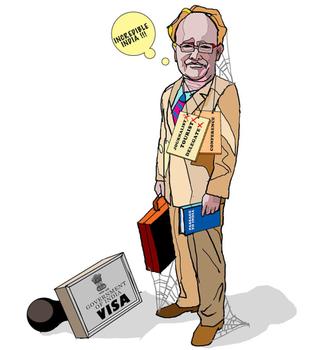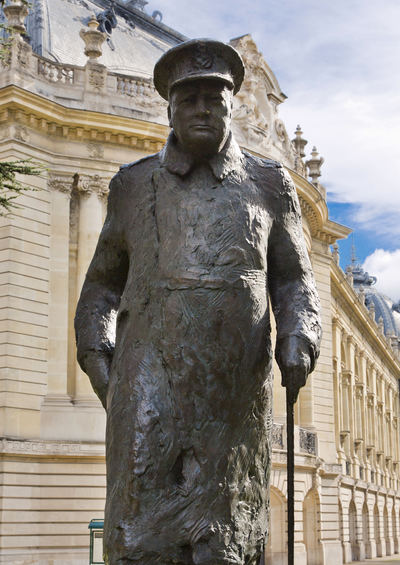Visiting India? Battling a Kafkaesque Bureaucracy
Reflections on the amazing difficulties of obtaining a visa to India.
November 24, 2014

It is often said that foreigners visiting India for the first time will either love it – or instinctively hate it. I suggest a third category: Open-minded visitors who are systematically induced by the Indian government to dislike the country before their first-ever arrival.
Like many global citizens, I had long heard about the stifling tentacles of the Indian bureaucracy. Still, I was not prepared for what was to come.
Kafkaesque BureaucracyAlso, the Modi government takes action on the issue:
Indian government announces new visa rules
After all, the Indian government has run the glossy “Incredible India“ advertising campaign for over a decade now. That campaign’s goal is to overcome a shocking imbalance in the global tourist trade.
Poor marketing?
The world’s largest democracy accounts for a truly miniscule share of international tourist visits – just 0.6%. China has a 5.1% market share (and 7.5% if Hong Kong is included), 12 times India’s share. Even Japan, quite reclusive and with only 1/10th the population of India, boasts a larger share of the global tourism market, at 1.0%.
Moving up that league table is a more than legitimate aspiration for India – and an economically sensible one. Tourist dollars, euros, yen or yuan are a valuable commodity for any nation. It should all be a no-brainer.
Little did I know, in my consecutive attempts to get a visa, there always seemed to be one last-minute unforeseen hiccup after another.
The only way to comprehend it all was to see myself as the humble – and systematically humbled – main character in the novel “The Castle” by Franz Kafka, the famous early 20th century Central European writer. His book captivatingly describes a man’s struggles to gain access to a castle that towers high above a village and all the common folk.
The book is a parable for individuals’ futile struggle against the highhandedness of a government that keeps itself deliberately at a distance from the very people it is supposed to serve.
The impassable walls of bureaucracy
The first time I applied, to travel to a World Bank-sponsored conference held in Delhi, my visa did not arrive in time. I was far from the only conference participant denied access to the Indian castle.
In that case, there was the curious matter of having to have an official invitation letter (understandable), but also having it certified by the Ministry of External Affairs/Ministry of Home Affairs (incomprehensible, other than as a job-creation scheme).
Another time, I planned a personal, entirely tourism-oriented visit. Thankfully, I needed no letter of invitation from a conference organizer or its certification by a government office.
And yet, I failed in that attempt to get access to the “castle,” too. What was the cause for the fatal delay that time? Even though I had been assured by the government’s visa processing outsourcing service upon filing that everything was in order, it was not.
At the last minute, the Indian authorities decided that, since one of my occupations is to run a global affairs website, I would have to file for a journalist visa.
It did not matter that the purpose of my trip was to visit an old friend. Once Indian authorities decide one way, everyone’s only choice was to oblige. Otherwise, I would not gain access to the castle.
Here is the kicker: Even though my departure was imminent, the visa service manager told me that the visa granting procedure for journalists was quite an involved one. At best, it would take several weeks. And there was absolutely no way to expedite the procedure.
Compounding problems
I was speechless. And quite naturally, I wanted to bag the whole application and just get my passport back. The visa service manager helpfully explained why that would be a disastrous decision.
If I unilaterally abandoned a visa application procedure, the authorities would consider that as their having denied me a visa. That would make it much harder in the future to ever make it into the castle, aka India.
This high-handed practice effectively also robbed me of my freedom to travel internationally, which I have to do frequently. In order to travel abroad, one needs to be in possession of a passport.
My own passport was in effective lockdown with the Indian authorities until they would deign issuing me a journalist visa for an entirely private tourist visit.
To add further sting to this, when the Chinese say visa processing will take seven business days, it does. No more, no less. And China is not the nation that advertises itself as the world’s leading IT back office.
This October, I humbly tried again. Third time’s a charm, they say. Even though planning a tourist trip, since I still just wanted to see India for the first time, I was nevertheless told that I would have to apply as a journalist. Once deemed a journalist by Indian authorities, forever a journalist.
Curiously enough, the authorities also wanted me to sign a form that I would “not engage in any journalistic activities” – even though they required me to apply for a “J” visa.
A problem of conscience
I could not sign that form in good conscience. I am a columnist – and, in that capacity, always have my ears and ears open and I generally travel with my brain wide alert. How could I sign such a form, without being completely muzzled – or lying by signing a form that is an obvious logical impossibility?
Now you must wonder about the outcome of my application process this time around. Was three times a charm?
Indeed, it was. As you read this article in the pages of this newspaper, I am happy to report that I actually made it to India – and loved every minute.
I had the good fortune that a very senior Indian diplomat, recently retired, had made it his personal mission to have his colleagues in Washington look out for my application this time around.
With his intervention, everything worked like a charm. As grateful as I am for that act of kindness, one shouldn’t have to rely on such good fortune. It should be a matter of, yes, bureaucratic routine to process such applications expeditiously.
Takeaways
It is often said that foreigners visiting India for the first time will either love it – or instinctively hate it.
India accounts for a truly minuscule share of international tourist visits.
When the Chinese say visa processing will take seven business days, it does.
The authorities wanted me to sign a form that I would “not engage in any journalistic activities” while in India.

